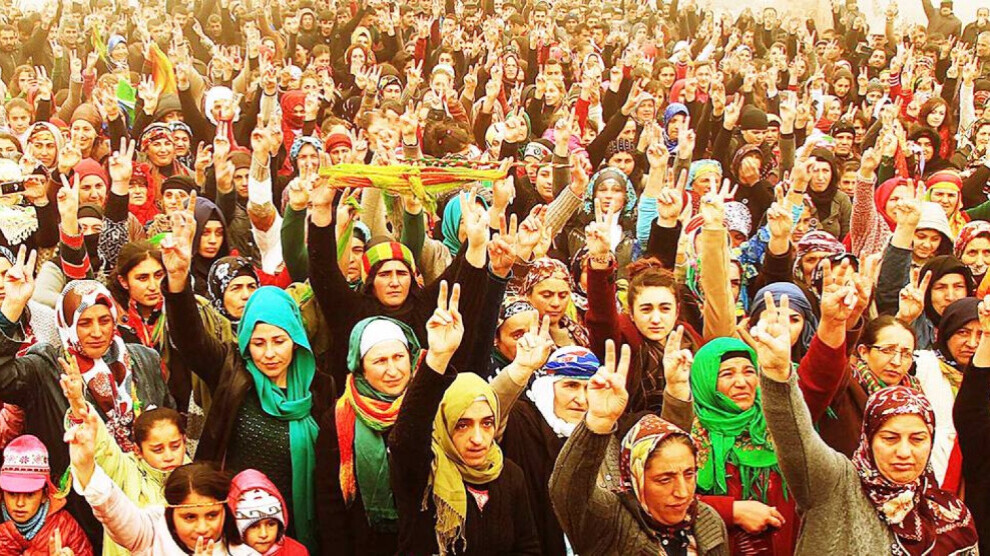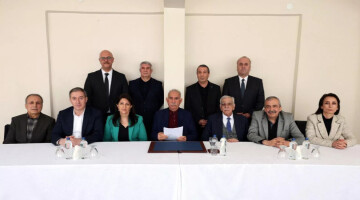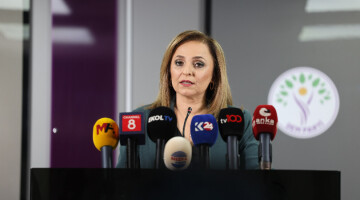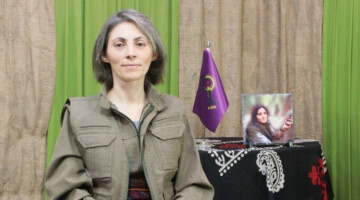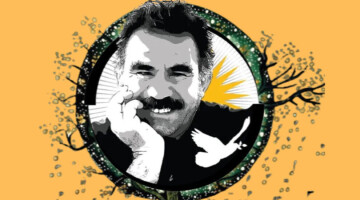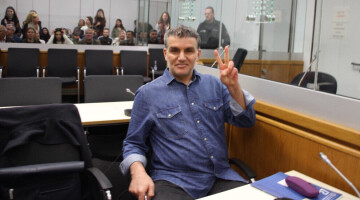The great philosopher Adorno actually made a tremendous contribution to the world of thought and mind of humanity with his remark ‘A wrong life cannot be lived rightly’. With this proposition, wrong minds, wrong politics, wrong thoughts and wrong representations will never be able to produce the right work, action and solution for the peoples. Especially since 1 November 2024, quite dangerous and the most refined of special war policies are being implemented over Leader Abdullah Öcalan, who has been kept under absolute isolation in İmralı Island Prison. Over Leader Öcalan, politics, society, the Kurdish Freedom Movement and the entire region are being redesigned. In order to achieve these goals, black news and manipulative information are being spread around with a dirty war bombardment. The manner in which this event is organised and created is itself a special warfare practice. Since 1993, the Kurdish Movement and its leadership have clearly demonstrated its stance and approach towards solution by calling for a ceasefire and revealed its sincerity at the highest level.
On this basis, Turgut Özal, the prime minister of the time, and a group of state officials put forward a serious position on the resolution process: ‘During his term as President, Turgut Özal was convinced that the Kurdish issue could not be solved by military means. He was in favour of peaceful solutions to the Kurdish issue and argued for some reforms in this regard. Özal developed a new perspective on the Kurdish issue, emphasising the need to recognise cultural and political rights. He argued that some initiatives should be taken, especially in the use of the Kurdish language.’ This political stance was mediated by the PUK (Patriotic Union of Kurdistan) leader Rêzdar Jalal Talabani and he put forth an intensive practice for the successful conclusion of the process. Leader Öcalan responded to the process with a unilateral ceasefire on 17 March 1993. The sabotage of the process started with Turgut Özal's sudden and suspicious death of a ‘heart attack’ on his return from Turkmenistan; Şemdin Sakık also sabotaged the process by killing new soldiers on behalf of the guerrilla. The aftermath is known to all of us as a deluge.
On 1 September 1998, the Turkish Republic responded to the ceasefire with a conspiracy and as a result, on 15 February 1999, Leader Öcalan was taken prisoner by an international conspiracy. However, he has always insisted on ceasefire, peace and solution policies. These searches for a solution and peace were conducted under the auspices of a third power as the 2009 Oslo Talks, with the participation of both senior officials of the state and senior officials of the PKK. The state turned this process into a liquidation strategy for both domestic and foreign politics, and based its liquidation in Bakur (Northern Kurdistan) on the largest political operation in history. The AKP government, acting in partnership with FETÖ, wanted to take Bakur under the name of the KCK Operation.
While the Middle Eastern countries were experiencing a deep upheaval with the Arab Spring, the Turkish-AKP-MHP government, which sponsored Islamofascist terrorist organisations, fed and raised all terrorist organisations, especially ISIS, FSA and Al-Nusra, and attacked the Kurdish Freedom Movement in order to liquidate the 3rd line paradigm developing on the Syrian ground and in Rojava and to achieve its regional hegemony on the Aleppo-Kirkuk line to achieve its Neo-Ottoman ambitions. In fact, during this very period, in İmralı, Leader Öcalan and a delegation consisting of both state officials and HDP deputies were conducting a process under the name of ‘İmralı Resolution Process and Negotiations’. However, it was later understood that the AKP-MHP government had prepared the ‘Decomposition Plan’ aiming at the absolute liquidation of the Kurdish movement, especially in Northern Kurdistan, in four parts and abroad, and turned to intrigues by instrumentalising the resolution process.
While the process initiated in 2013 was called the ‘Dolmabahçe Consensus’ with the approval of both parties, the fascist chief Erdoğan denied the consensus and started the genocide. On the anniversary of the Treaty of Lausanne, on 24 July 2015, he increased his attacks in Sur, Cizre, Silopi, Şırnak, Nusaybin and many other areas to an unprecedented level in history with the ultimate goal of liquidation, along with air strikes on the Medya Defence Zones, especially in Qandil. However, the resolution process was the longest lasting peace initiative between the state and the PKK in Turkish history. Expectations were raised in society for peace and an increase in democratic rights. Yet, with the end of the process, these hopes were shaken to a great extent. Following the failure of the resolution process, conflicts resumed in Turkey and genocidal policies deepened even more.
The resolution process was an important step towards the reduction of violence, the development of democratic rights and a peaceful resolution to the Kurdish issue. The interruption of the process revealed the difficulties of a peaceful resolution to the conflict and the importance of political balances in the region. Nearly 10 years of uninterrupted decomposition operations and moves were frustrated by the unprecedented resistance of Leader Öcalan in İmralı, the guerrilla, the people and the movement, and the AKP-MHP fascism was brought to the brink of collapse. In such a process, the fascist leader Devlet Bahçeli wanted to create a new agenda with calls addressed to the person of Leader Öcalan. It was aimed that all politics would be united around this agenda and join the special war policies. The goal here was to impose a so-called resolution process by putting everyone under pressure with a very low, vulgar and fascist style instead of addressing Leader Öcalan as a party to the solution.
Leader Öcalan, who has comprehensive experience and practice focused on solution and peace for more than 30 years, reiterated his position in a meeting with his nephew and DEM Party deputy Ömer Öcalan 44 months later, on 23 October 2024, in İmralı, saying: "Isolation continues, there is no negotiation or meeting between us and the state, but theoretically and practically I have the power and will to solve the Kurdish question ’.
As can be seen in the experiences of more than 30 years, which we have tried to explain above, every time the state and politicians showed up with the rhetoric of peace and solution, they brought greater troubles and disasters to the Kurds. Therefore, peace and solution will not be as easy as it is thought to be, and the fascist Turkish Republic and its AKP-MHP ruling clique will not easily favour a solution; they will want to eliminate the deep and historical destruction they have experienced by manipulating the process with tricks and games.
It is precisely in such periods that we, as a society, people and politics, must be persistent, determined and consistent in our own political and political agenda. While Kurds and Kurdistan play a key role in the reality of the Middle East, where the future of the world is being shaped, we Kurds also represent the power to solve the crisis and chaos. For this reason, we must not only be vigilant against special war games, but we must always be aware of and insist on democracy, women's rights and freedoms in national, regional and universal terms. We should not be the ones who take the process with misguided and expectant approaches, the agendas of the sovereigns and get hopeful. Carrying Leader Öcalan’s will and power for a solution to absolute success will be crowned with the right, determined and persistent struggle that we will wage in the mountains, countryside, plains, villages and cities.
When we say ‘Peace Now’ and above all when we fight for the physical freedom of Leader Öcalan, we must insistently prioritise the following: ‘freedom right now’.

